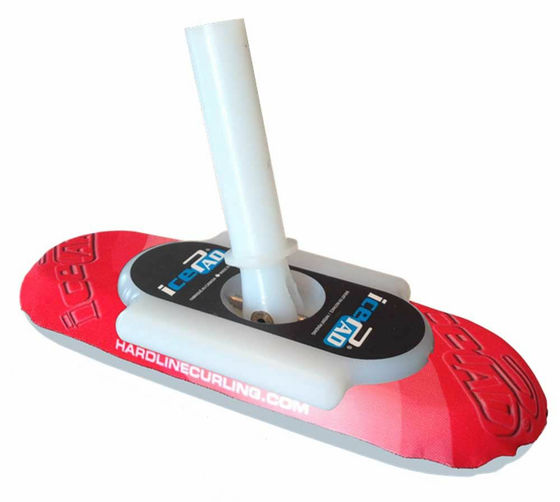What was the 'Bloomgate Scandal' involving technical cheating in curling?

The World Curling Association has tightened the rules on equipment in preparation for the 2026
World Curling tightens sweeping rules, bans firmer broom foams ahead of Olympics | CBC Sports
https://www.cbc.ca/sports/olympics/winter/curling/world-curling-broom-ban-1.7566638

Curling's only scandal: How 'Broomgate' changed the game forever | CBC Sports
https://www.cbc.ca/sports/olympics/winter/curling/broomgate-curling-scandal-1.7354882
Bloomgate is a controversy over technology doping that arose during the 2015-2016 curling season, in which the technology used to brush and sweep the stones - known as 'sweeping' - improved dramatically and dramatically changed the game.
Curling is a sport in which a stone is slid across the ice (shot) and the direction of the stone's movement is adjusted with a brush to reduce friction and allow the stone to move further and in a straighter trajectory. However, synthetic brushes that appeared in 2015 have finer surface materials and structures than conventional nylon brushes, and the effect of friction is extremely large, making it possible to not only polish the surface of the ice, but also physically scrape it.

As a result, the effect of the sweep is not only to send the stone farther and straighter, but also to change the curve of the stone, making it possible to control the speed and direction of the stone to an extreme extent. There were many cases where players were able to turn the situation around by simply sweeping, even in strategically disadvantageous situations, and this drew criticism, with people saying that it 'takes away the skill to shoot the stone' and that 'it is unfair to be able to make up for a missed shot with a sweep.'
One of the more controversial products was a brush called 'icePad' manufactured by Hardline Curling, a company that was just starting out at the time. The brush head was made of a textured synthetic material that could physically change the surface of the ice, allowing the user to intentionally control the trajectory and speed of the stone, and in experiments it was reported that the user could even reproduce movements that were physically impossible with a regular brush.

The 2015 Stu Sells Toronto Tankard , an annual curling tournament in Toronto, Canada, was one of the tournaments where the Broomgate scandal came to light. In this tournament, a team using ice pads clashed with a team using an even more powerful brush called 'Black Magic,' which was created to compete with the ice pads. The Black Magic was so powerful that the ice pad teams were so infuriated that a 'gentlemen's agreement' was made midway through the tournament to not use either brush head. The final of the tournament was also between Ice Pads and Black Magic, and the gentleman's agreement was rejected, resulting in the need to clean the ice that had been damaged by the Black Magic sweep, which extended the game by more than the usual hour. In the end, the Black Magic team lost after missing one shot due to the ice being so damaged.
The Broomgate issue spread to other competitions, and the World Curling Association took measures to temporarily suspend the use of new brush heads in November 2015. After that, in May 2016, the 'Sweeping Summit' was held to test various brush heads, and new regulations regarding brush materials and structures were established.
Former curler and comedian John Cullen hosted the CBC podcast ' Bloomgate: The Curling Scandal ' and detailed the Bloomgate scandal. 'No one died, and no one is in danger from talking about the Bloomgate scandal. Still, a significant number of curlers haven't forgotten what happened, and that's why they still don't want to talk about it,' Cullen said, talking about the deep roots of the problem at the time.

The Bloomgate scandal, which began in 2015, was resolved with the strengthening of rules in 2016, but efforts to exploit loopholes in the rules have reignited and have begun to attract attention again since around 2023. Some manufacturers are using new materials that can strongly cut ice within the limits of the rules, and technologies that appear to 'extremely improve sweeping performance' while complying with the rules are emerging. This is called 'Bloomgate 2.0', and in January 2025, ahead of the 2025 Masters Grand Slam , 15 strong men's and women's curling teams gathered together and submitted a 'Proposal for Fair Play in Curling' to the World Curling Association, summarizing concerns about the new pad technology used by some teams.
On June 20, 2025, the World Curling Association announced an update to its equipment regulations for the Olympic season. The World Curling Association stated, 'Following the reported challenges of over-effectiveness of multiple brush head structures throughout the 2024-2025 season, we will immediately update our cleaning equipment compliance regulations for the Olympic season,' and limited the brushes approved for use at the World Curling Championships to a limited number of brushes. The World Curling Association said, 'We deeply regret the issues with our previous testing process that contributed to the critical situation last season. We recognize the importance of reliable and ongoing testing and are committed to building effective pre-competition testing to enhance the reliability of this sport. For the long-term future and stability of our sport, we will continue to work and consult closely with stakeholders while strengthening our equipment policies and testing protocols.'
Related Posts:
in Note, Posted by log1e_dh







